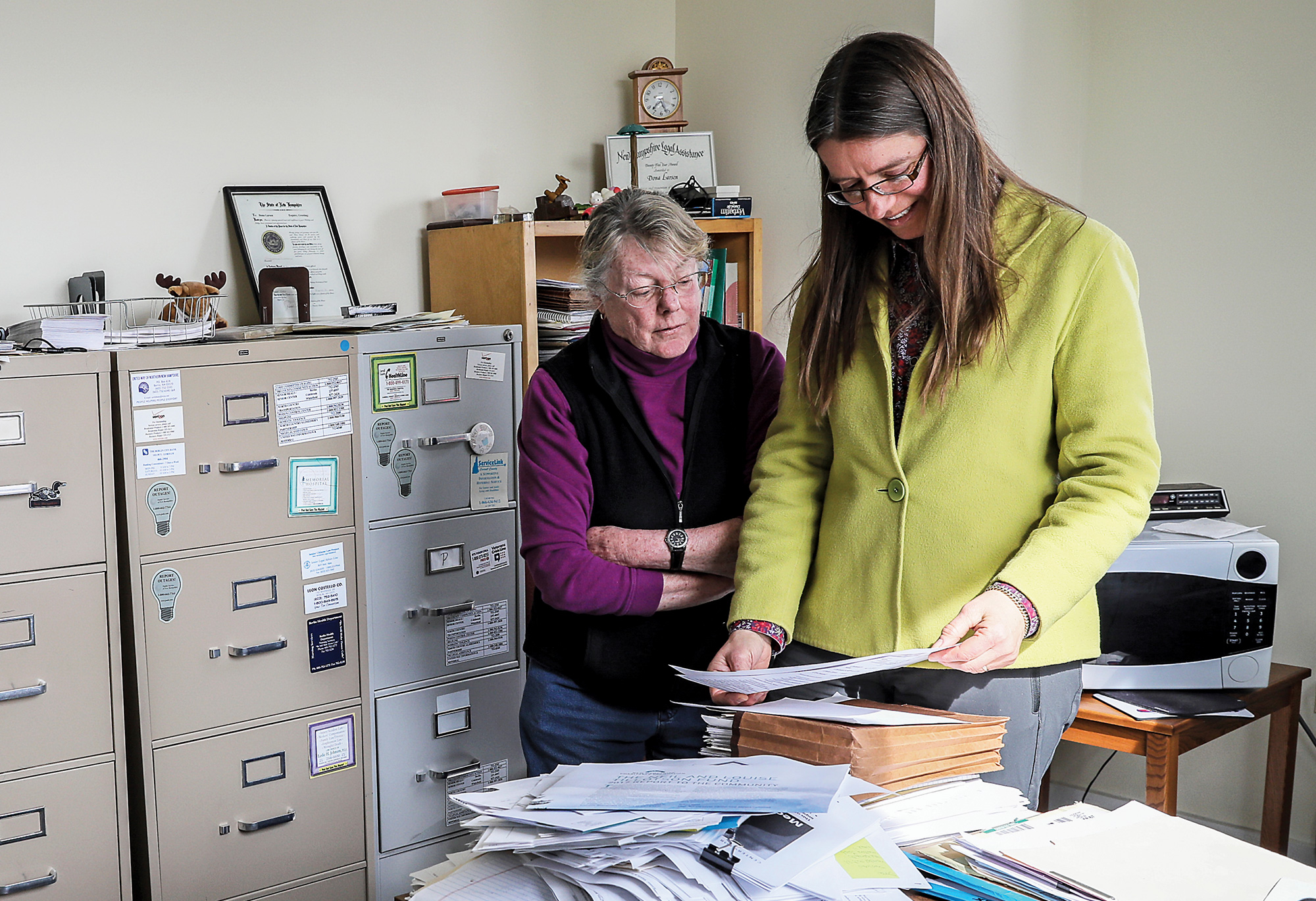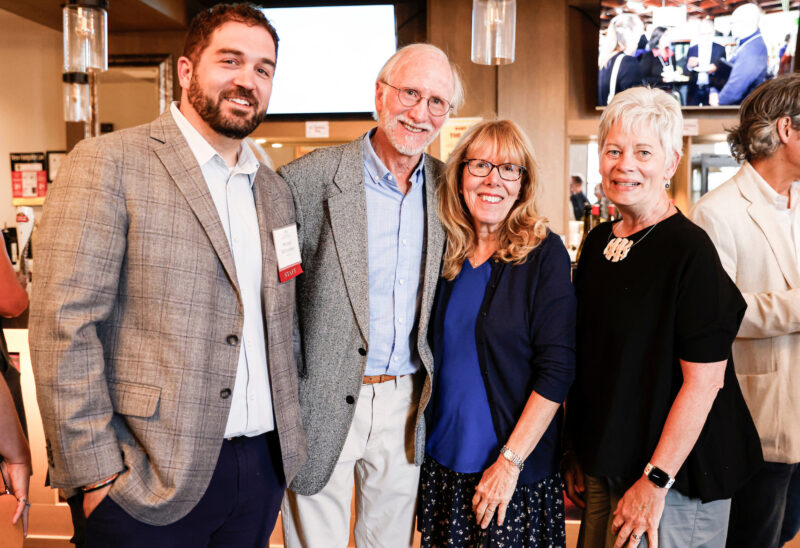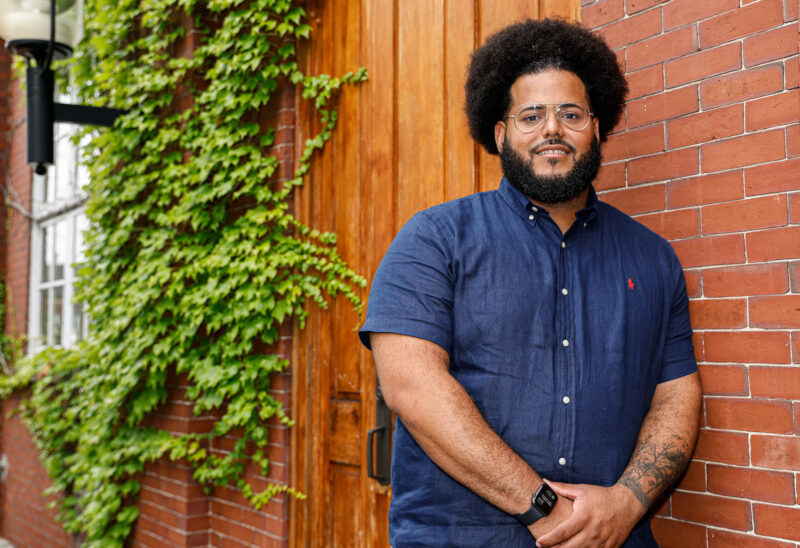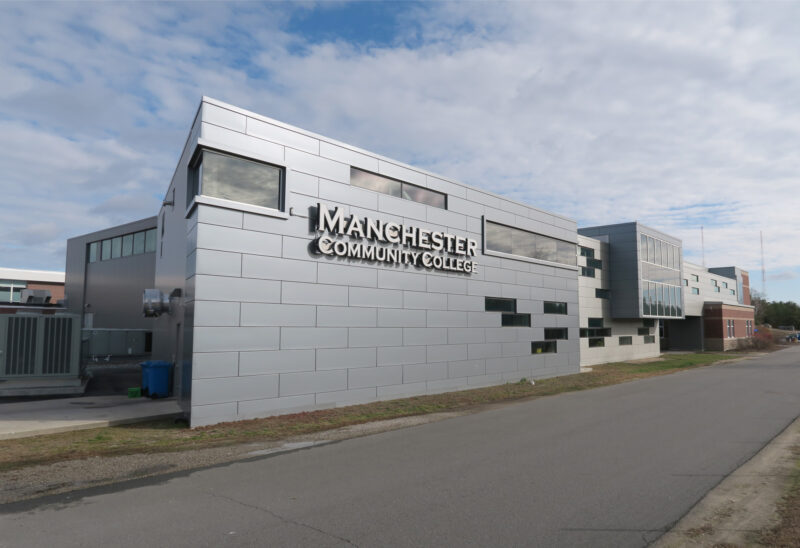Case load (partial): A single mom, working full-time at a fast-food job, about to be evicted with her preschooler. An elderly veteran who needs in-home care to be able to stay in his Section 8 housing. A young woman who needs a restraining order against an abusive ex-boyfriend. An elderly man whose electricity is about to be shut off. A woman with serious medical issues caused by a brain tumor who lost her disability benefits and is now in danger of losing her mobile home.
Every day, attorney Ruth Heintz and paralegal Dona Larsen show up for work at the sparsely-furnished office of New Hampshire Legal Assistance in Berlin and help people with an intricate array of civil legal problems. This two-woman legal team covers a vast territory, from Plymouth to the Canadian border.
They help people from becoming homeless, help protect them from domestic violence, help them work out custody arrangements or keep the benefits that allow them to care for disabled kids. The details shift, the names and faces change, but there is never a day when someone does not need their help.
The Berlin office, next door to the Legion Hall and across the road from the rushing Androscoggin River, is the only New Hampshire Legal Assistance office in the far northern reaches of the state. The next closest is Concord. If you live in, say, Pittsburg, and your transportation is unreliable, Concord might as well be in Paris, France.
From five locations across the state, New Hampshire Legal Assistance provides civil legal services to low-income residents — addressing problems related to people’s most basic daily needs, providing education and advocating for systemic change on issues faced by the population it serves.
Like all nonprofits, it struggles to maintain enough funding to provide these critical services.
Seven years ago, Legal Assistance saw its state funding cut by $1 million (from $1.7 million). The organization, which had also faced diminished funding from other sources, was forced to close offices in Nashua and Littleton and cut 15 staff positions. The Berlin office was also on the brink of being shuttered.
Grants from the Neil and Louise Tillotson Fund of the New Hampshire Charitable Foundation have kept the Berlin office open — and kept Heintz and Larsen available to people who need their help. While some state funding has since been reinstated, the Tillotson Fund continues to support operations in Berlin.
“Without the funding, we wouldn’t be here. Period,” says Larsen.
“If we don’t take the hard cases, who is going to?”– Ruth Heintz, attorney, New Hampshire Legal AssistanceTweet This
When Larsen came to work here, she was one of eight staff members, including two attorneys and three paralegals. The Berlin outpost of Legal Assistance had the largest law library in the North Country — which was available to anyone who needed it.
The North County has fewer practicing attorneys than other parts of the state, which makes the presence of Legal Assistance here even more critical — because the pool of lawyers willing to work pro bono is shallow indeed.
Heintz and Larsen drive dirt roads and byways to meet clients where they are. Often, their clients have no transportation. It’s not unheard-of to find them filling out paperwork in a Dunkin’ Donuts, or in a borrowed office, or clearing off space on the countertop of a mobile home to explain a case.
Judith was referred to Legal Assistance from a domestic violence crisis center. She had quit college when she got together with her husband. Now, she needed help with a restraining order and needed a lawyer to represent her in a divorce and custody case. Heintz was that lawyer.
“Just to have somebody who could represent me and talk for me was so important,” Judith said. “I was there and I was facing him, but if I had to do it by myself, I don’t know that I could have. I can’t promise that I wouldn’t have gone back … I had Ruth right by my side.”
Often, Heintz and Larsen’s jobs are about helping people to clear the chaos that swirls around poverty. After Judith’s restraining order and divorce were settled, the chaos gathered again: her student loan company sued her for collection of debt. Heintz is representing her in that case, working to get the loans put on hold while Judith gets back on her feet. Judith is working as a cashier now, building her credit and planning to go back to college. Heintz will represent her at her next hearing.
This is not the kind of legal work that will make you rich, or even close. But there was no other kind of legal work Heintz ever wanted to do. She went to Dartmouth College and then to law school specifically to become a legal aid lawyer. She sees herself as the small-town lawyer she is, and comes to work in a pantsuit with a woodsman’s flannel coat over it.
Larsen grew up in Berlin’s “Norwegian Village” and came to work for Legal Assistance in 1978. She drove her last car until it had 250,000 miles on the odometer — and only replaced it after a collision with a deer.
“I wanted to do something to help people in the most basic ways,” Heintz says. “Doing this work, you have that capacity to help people, to challenge the law and to create systemic change.”
Systemic change that Legal Assistance has pushed for includes successful advocacy for Medicaid expansion, protections to prevent lead poisoning in children and expansion of energy-efficiency programs for low-income residents. In 2016, Legal Assistance successfully argued before the state Supreme Court to strike down a state rule that had required children’s disability benefits to be calculated as part of household income when people applied for help from the Temporary Assistance for Needy Families (TANF) program. Heintz argued that case.
The cases that Legal Assistance takes are often complicated, and can be heartbreaking, and frustrating.
“If we don’t take the hard cases,” Heintz asks, “who is going to?”













![Rev. Heidi Carrington Heath joined Seacoast Outright. [Photo by Cheryl Senter]](https://www.nhcf.org/wp-content/uploads/2024/05/Heidi-Carrington-Thumbnail-800x548.jpg)
![Dr. Jennie Hennigar treats a patient at the Tamworth Dental Center [Photo by Cheryl Senter]](https://www.nhcf.org/wp-content/uploads/2024/05/TCCAP-Hero-800x548.jpg)

